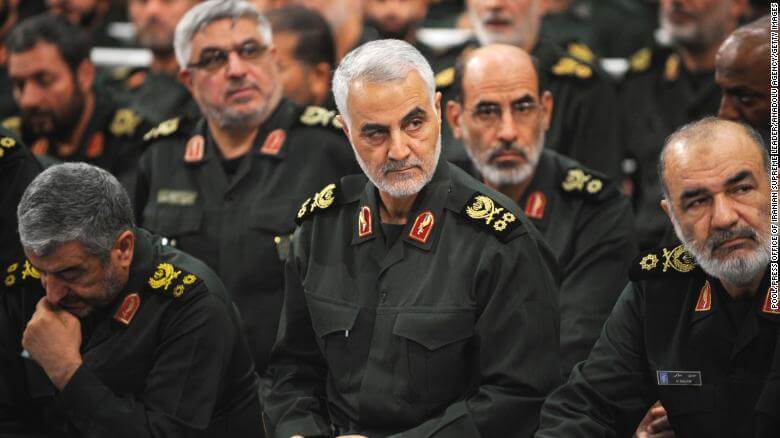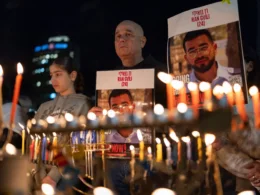As negotiations between Iran and U.S. officials over the revival of the 2015 Joint Comprehensive Plan of Action (JCPOA) are ongoing, Tehran has made it clear to the Biden administration that it will not abandon its plans to avenge the death of Islamic Revolutionary Guards Corps (IRGC) General Qasem Soleimani. The now deceased Iranian General was leader of the infamous Quds Force of the Jerusalem Force, an elite clandestine wing of the IRGC. As U.S. officials have tried to offer economic sanctions relief and other concessions in exchange for Iran to cease any revenge operations, the regime has remained adamant on its pledge.
In early 2020, IRGC Quds Force Chief Qasem Soleimani was killed by the Trump administration through a drone strike in Iraq at Baghdad International Airport. Administration officials like Secretary Mike Pompeo and then President Donald Trump argued that the strike was necessary given the past and current actions Soleimani and his forces committed against U.S. personnel and allies in the Middle East, and it served as a signal to Tehran to put an end to Iran’s escalating regional actions.
In response to the killing, Iranian officials and their Islamic followers have been and continue to mourn for one of the world’s most lethal terrorist commanders and have publicly doubled down on avenging his death.
After the U.S. operation, Iran reduced its final commitments to the 2015 nuclear agreement and described the strike as an act of terrorism. Several days after the drone strike, Iranian forces launched a series of missile attacks on U.S. forces in Iraq to send a message to the U.S. that Soleimani would be avenged no matter the cost. In 2021, the Iranian government went to the International Police or Interpol to issue a red notice for the arrest of President Trump and other U.S. officials for killing the Quds Force Chief.
“Let us be clear; Soleimani was a monster who had the blood of innocent Iranians, Americans, and Israelis on his hands, Bryan E. Leib, executive director of Iranian Americans for Liberty said.
“The Islamic Republic of Iran has made it very clear that they intend to avenge the killing of the world's number one terrorist, Qasem Soleimani,” he said.
In the months after this event, reports came out that Iran has threatened former Trump administration officials and has plans to assassinate individuals like former Secretary of State Mike Pompeo, former National Security advisor John Bolton, and other State Department officials. In response, the federal government has increased security for these individuals fearing that Iran could try to assassinate officials to avenge Soleimani’s death.
Tehran’s refusal to desist from avenging Soleimani as a precondition to move forward in the nuclear agreement talks with U.S. officials shocking and audacious. Tehran meanwhile desperately awaits economic sanction relief and other concessions from Biden administration officials, who are desperately trying to revive the 2015 nuclear agreement.
When asked how serious the U.S. should take Iran’s vengeful actions, Richard Goldberg, a senior advisor at the Foundation for Defense of Democracies (FDD), stated that “when terror-sponsoring dictators tell us what they plan to do, we should believe them.” According to Goldberg, the question that now remains is “less about whether the U.S. should remove the IRGC from the terrorism list and more about why the Biden administration is conducting any negotiation whatsoever with a regime pledging terrorist attacks against Americans.”
“Is the White House really going to lift a single sanction on Iran amid active plots to kill Americans?” Goldberg reasoned.
Similarly, Navid Mohebbi, a Policy Fellow at the National Union for Democracy in Iran (NUFDI), stated that “public threats against public figures, diplomats, and heads of state are nothing new, given the Iranian regime has ignored international laws and norms since its inception.” Mohebbi further explained that one of the reasons why the regime has never carried out its threats was “the deterrent power of the United States and the severe consequences that even bringing up the threats would have had for their regime.”
U.S. officials have stated that if the JCPOA were to be revived, the U.S. would have the ability to use powerful tools to address Tehran’s destabilizing activities and its support for terrorism and terrorist proxies in the Middle East, particularly the IRGC.
However, according to Mohebbi, in the absence of credible deterrence, the regime does not fear the U.S. under the leadership of President Biden; that's the main reason that emboldened the regime. Had the Biden administration imposed a cost on the regime for its plot against an Iranian American journalist in Brooklyn last year, the mullahs' regime would have not been brazenly threatening American citizens.”









